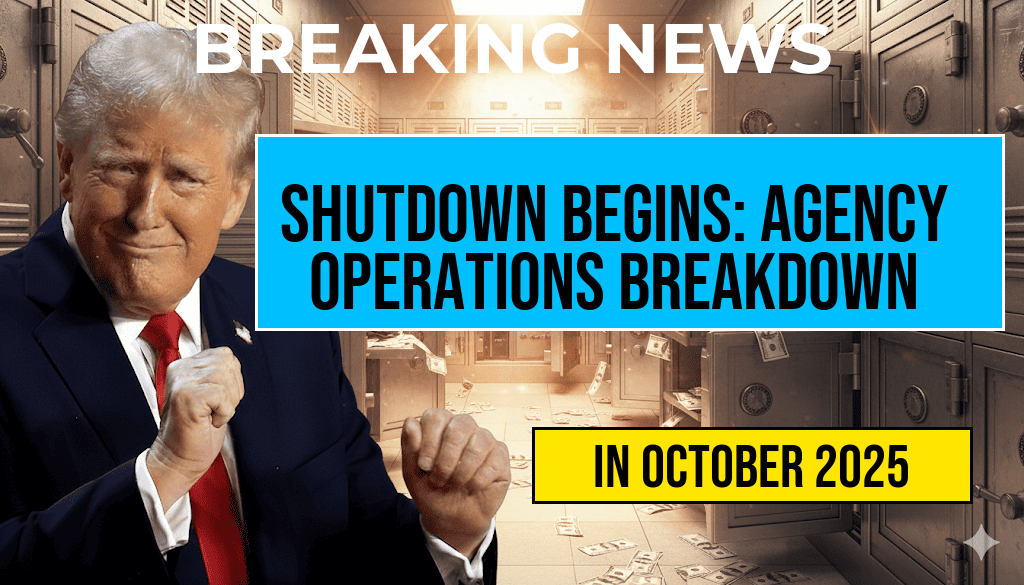The United States government officially entered a shutdown on Saturday morning after lawmakers failed to reach an agreement on funding levels, halting or limiting operations across numerous federal agencies. While some essential services like national security and public safety are expected to continue functioning, many government programs and administrative offices will suspend operations or significantly reduce services. The shutdown affects a wide spectrum of agencies, with critical departments such as the Social Security Administration, Internal Revenue Service (IRS), Department of Defense, and Transportation Security Administration (TSA) experiencing varying degrees of closure or staffing shortages. This breakdown provides a detailed look at which agencies are operating, which are partially functioning, and which are shuttered amid the impasse in Congress, illustrating the immediate impacts on millions of Americans dependent on federal services.
Federal Agencies and Services During the Shutdown
Essential Services and Agencies Remaining Open
During a government shutdown, agencies deemed vital for public safety and national security typically maintain operations. These include:
- Department of Defense: Active-duty military personnel continue to perform their duties, though many support staff may be furloughed.
- Transportation Security Administration (TSA): Security screenings at airports continue without interruption to ensure air travel remains operational.
- Federal Emergency Management Agency (FEMA): Emergency response and disaster relief efforts proceed as usual.
- U.S. Coast Guard: Operational to support maritime safety and security.
- Federal law enforcement agencies: Agencies such as the FBI and DEA continue core functions.
Agencies Experiencing Partial Operations or Furloughs
Many federal agencies, while remaining partially operational, face significant staffing reductions or service disruptions. These include:
- Social Security Administration (SSA): Most field offices close, but critical functions like processing benefit payments continue remotely.
- Internal Revenue Service (IRS): Most services are suspended, including audits and taxpayer assistance; however, tax refunds scheduled for direct deposit are generally unaffected.
- Environmental Protection Agency (EPA): Most non-essential staff are furloughed, affecting environmental inspections and enforcement activities.
- National Parks Service: Visitor centers and park facilities close, impacting tourism and conservation efforts.
- Department of Education: Most functions are halted, though student aid disbursements may continue if already processed.
Agencies and Services Fully Shutdown
Several federal bodies face complete closures, halting all but essential operations:
- Federal Courts: Many federal court proceedings are postponed or canceled, affecting legal processes nationwide.
- National Archives and Records Administration (NARA): Most facilities close to the public, limiting access to historical documents and records.
- Small Business Administration (SBA): Loan processing and disaster assistance programs are temporarily paused.
Impacts on Daily Life and Federal Programs
Public Benefits and Payments
Despite the shutdown, Social Security payments are generally unaffected, with most recipients receiving their benefits on schedule. However, some services such as in-person assistance at local offices are unavailable. The IRS has indicated that tax refunds scheduled for direct deposit will continue, but taxpayer assistance lines are inactive, creating delays for those seeking help with tax issues.
Security and Safety Protocols
Security at airports remains intact, thanks to TSA staffing. National security agencies, including the FBI, continue operations, although administrative staff and support personnel are furloughed, potentially affecting ongoing investigations or administrative tasks.
Impact on Federal Contractors and Local Economies
The shutdown also affects federal contractors, many of whom face unpaid leave or delays in payments. Local economies near federal installations, especially in areas reliant on tourism to national parks, face economic downturns as visitor access diminishes.
Government Response and Next Steps
Lawmakers are under pressure to negotiate a funding agreement to reopen the government. The prolonged impasse risks further disruptions, including potential delays in payments, cancellations of public services, and impacts on federal employees’ livelihoods. The Biden administration has emphasized the importance of bipartisan cooperation to resolve the budget deadlock and restore full agency operations.
Agency-by-Agency Operational Status Table
| Agency | Status | Notes |
|---|---|---|
| Social Security Administration | Partially Operating | Payments continue; offices closed |
| IRS | Partial Operations | Tax processing; public assistance suspended |
| Department of Defense | Operational | Active military; support staff furloughed |
| TSA | Operational | Airport security screenings ongoing |
| EPA | Shutdown | Most activities suspended |
| National Parks Service | Shutdown | Visitor centers closed |
| Federal Courts | Shutdown | Many proceedings postponed |
| NARA | Shutdown | Facilities closed to the public |
As negotiations continue, the full scope and duration of the shutdown remain uncertain. Citizens are advised to check with official agency websites for updates on service availability and operational changes during this period. For more details on government shutdown procedures and their implications, visit Wikipedia’s overview of U.S. government shutdowns and Forbes’ coverage on federal budget crises.
Frequently Asked Questions
What does a government shutdown mean for Social Security beneficiaries?
During a government shutdown, Social Security benefits typically continue to be paid as they are considered mandatory spending. However, some related services, such as in-person assistance or certain customer service operations, may be limited or delayed.
Which agencies are affected by the shutdown and which continue to operate?
The government shutdown affects various agencies differently. Essential services, such as the Defense Department and Transportation Security Administration (TSA), continue to operate, while non-essential agencies or functions may halt operations or suspend services until funding is restored.
Will the IRS still process tax refunds and handle taxpayer inquiries during the shutdown?
Typically, during a government shutdown, the IRS reduces operations significantly. Most services, including processing of tax refunds and responding to taxpayer inquiries, are likely to be delayed or unavailable until funding is restored.
How does the shutdown impact defense operations and military personnel?
While defense operations and military personnel generally continue to perform their duties, many civilian support functions may be curtailed or suspended, and some non-essential activities may be temporarily halted until funding is reinstated.
Are TSA agents still working during a government shutdown?
Yes, TSA agents are considered essential personnel and will continue to operate at airports and transportation hubs during a government shutdown, ensuring the safety and security of travelers without interruption.






